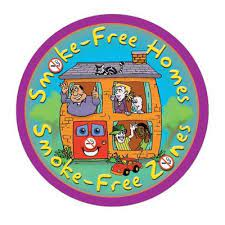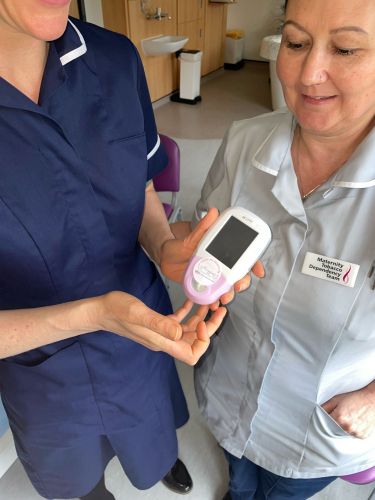Quit smoking with the help of our Maternity Tobacco Dependency Team
-
You are three times more likely to quit successfully if you use a combination of nicotine replacement and behavioural therapy from our in-house Maternity Tobacco Dependency Team
-
The team offer non-judgemental support to people that smoke in pregnancy, they are dedicated to offering a kind and welcoming service that supports families to quit smoking
-
Ask your community midwife for a referral to the team or call one of the telephone numbers on the leaflet
-
Or contact your Maternity Tobacco Dependency Team directly who can offer a wide range of support to help you to stop
- BwD - Zoey / Shellie Tel: 07971 941184 / 07484 913744
- East Lancs - Katy / Kayleigh Tel: 07943 579738/ 07484 913742
- Service lead - Emma Bell Email: emma.bell2@elht.nhs.uk
Team email: maternitytobaccodependency@elht.nhs.uk
Smoking is bad for you, your unborn baby and your family.
When you breathe in tobacco smoke carbon monoxide is present in your blood. Carbon monoxide is passed through the placenta, this also reduces the amount of oxygen and nutrients being passed to your developing baby.
Smoking when you are pregnant increases your risk of:
- miscarriage
- ectopic pregnancy (a pregnancy growing outside the womb)
- your baby dying in the womb (stillbirth) or shortly after birth – one-third of all deaths in the womb or shortly after birth are thought to be caused by smoking
- your baby being born with abnormalities – face defects, such as cleft lip and palate, are more common because smoking affects the way your baby develops
- your baby’s growth and health being affected – the more you smoke, the less healthy your baby will be, and a baby that is small due to smoking is more likely to have health problems when young and also later in life
- bleeding during the last months of pregnancy, which is known as an abruption (when the placenta comes away from the wall of the womb) – this could be life threatening for you and your baby
- Premature birth, when you have your baby before 37 weeks of pregnancy
Babies and children whose mothers smoke during pregnancy are also at greater risk of:
- Sudden and unexplained death, known as sudden infant death syndrome (SIDS) – as well as happening to newborn babies, this can also happen to infants over 12 months: the risk is greater if you or your partner continue to smoke after she or he is born, particularly if you share a bed with your baby at night
- Asthma, chest and ear infections, and pneumonia
- Behaviour problems such as ADHD (attention deficit hyperactivity disorder)
- Performing poorly at school
Second-hand smoke
In addition to the above, 80% of second-hand smoke is invisible and odourless, and it contains more than 4000 chemicals.
Second-hand smoke increases the risk of:
- Lung cancer and heart disease in adults
- Cot death, meningitis, cancer, bronchitis and pneumonia in children
- Reduced growth in babies and premature births in pregnant women and people
- Children who live in the home of smoker are more likely to smoke themselves as an adult
- The less children are exposed to smoking, the more they will not see smoking as normal behaviour.
- There are three serious house fires a week in Lancashire caused by smoking materials (cigarettes, cigars, pipes etc.)

Quitting smoking during pregnancy
Quitting smoking in pregnancy is the single most important thing you can do for the health of your baby and you.
Quitting lowers the chances of:
- Stillbirth
- Miscarriage
- Growth restrictions
- SIDS (sudden infant death syndrome)
Maternity Tobacco Dependency Team Survey
If you have used the Maternity Tobacco Dependancy Team please could you spare a few minutes to evaluate your experience of the service using the link - https://bit.ly/3KNqW2S
Additional resources
Follow the links below for further information:
Carbon Monoxide
Exposure to carbon monoxide presents a risk to you and your baby and can be caused by smoking during pregnancy or other environmental factors.
Carbon monoxide (CO) is a colourless, odourless and tasteless poisonous gas present in exhaust fumes, faulty gas appliances, coal/wood fires, oil burning appliances and cigarette smoke.
"Carbon monoxide exposure is especially risky when you are pregnant. It's risky because carbon monoxide affects a growing baby’s access to oxygen, which is needed for healthy growth and development."
You should be offered a screening test at booking and again, at or after 36 weeks of pregnancy, to assess your levels of CO exposure. You can also ask the midwife at any antenatal appointment to test you.
Carbon monoxide testing when you are pregnant could highlight a household problem and prevent further exposure.
How the CO test is done: You breathe into a cardboard tube attached to a handheld monitor. The monitor then shows the reading on its screen, and your midwife will explain the result.
High levels of CO? The usual reason for a high level on the reading is exposure to cigarette smoke, either from your own smoking or contact with other people’s smoke. High levels can also mean you have a faulty gas or heating appliance at home or you have been in a car with a faulty exhaust.
Your midwife can share with you ways of eliminating your exposure, and if you are a smoker, or someone you live with is a smoker, then she can signpost you to support on quitting.
Our PICO baby monitors were funded by Maggies Stillbirth legacy.


Self-referral into the Maternity and Tobacco Dependency Service
Please complete the below questions and a member of the Maternity and Tobacco Dependency team will contact you soon. Thank you!


